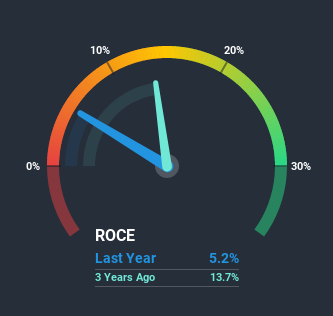Should You Be Impressed By Air New Zealand's (NZSE:AIR) Returns on Capital?

What are the early trends we should look for to identify a stock that could multiply in value over the long term? Amongst other things, we'll want to see two things; firstly, a growing return on capital employed (ROCE) and secondly, an expansion in the company's amount of capital employed. Put simply, these types of businesses are compounding machines, meaning they are continually reinvesting their earnings at ever-higher rates of return. However, after investigating Air New Zealand (NZSE:AIR), we don't think it's current trends fit the mold of a multi-bagger.
Return On Capital Employed (ROCE): What is it?
If you haven't worked with ROCE before, it measures the 'return' (pre-tax profit) a company generates from capital employed in its business. The formula for this calculation on Air New Zealand is:
Return on Capital Employed = Earnings Before Interest and Tax (EBIT) ÷ (Total Assets - Current Liabilities)
0.052 = NZ$309m ÷ (NZ$8.8b - NZ$2.9b) (Based on the trailing twelve months to December 2019).
So, Air New Zealand has an ROCE of 5.2%. Ultimately, that's a low return and it under-performs the Airlines industry average of 8.1%.
Check out our latest analysis for Air New Zealand
Above you can see how the current ROCE for Air New Zealand compares to its prior returns on capital, but there's only so much you can tell from the past. If you'd like to see what analysts are forecasting going forward, you should check out our free report for Air New Zealand.
The Trend Of ROCE
When we looked at the ROCE trend at Air New Zealand, we didn't gain much confidence. Around five years ago the returns on capital were 9.0%, but since then they've fallen to 5.2%. On the other hand, the company has been employing more capital without a corresponding improvement in sales in the last year, which could suggest these investments are longer term plays. It's worth keeping an eye on the company's earnings from here on to see if these investments do end up contributing to the bottom line.
In Conclusion...
Bringing it all together, while we're somewhat encouraged by Air New Zealand's reinvestment in its own business, we're aware that returns are shrinking. And in the last five years, the stock has given away 13% so the market doesn't look too hopeful on these trends strengthening any time soon. Therefore based on the analysis done in this article, we don't think Air New Zealand has the makings of a multi-bagger.
One more thing, we've spotted 3 warning signs facing Air New Zealand that you might find interesting.
For those who like to invest in solid companies, check out this free list of companies with solid balance sheets and high returns on equity.
This article by Simply Wall St is general in nature. It does not constitute a recommendation to buy or sell any stock, and does not take account of your objectives, or your financial situation. We aim to bring you long-term focused analysis driven by fundamental data. Note that our analysis may not factor in the latest price-sensitive company announcements or qualitative material. Simply Wall St has no position in any stocks mentioned.
Have feedback on this article? Concerned about the content? Get in touch with us directly. Alternatively, email editorial-team@simplywallst.com.


